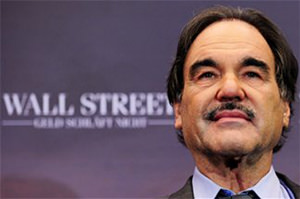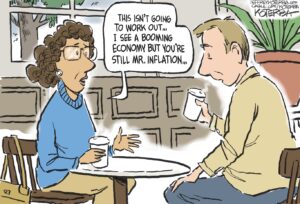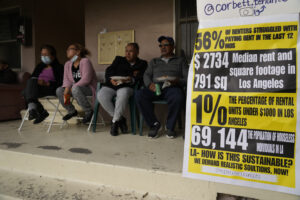Oliver Stone on Occupy Wall Street: ‘Grab the Power’
The collaboration between director Oliver Stone and one-man political think tank Tariq Ali began not three years ago, but their mind-meld has already produced three projects spanning multiple continents and eras. Stone gave a talk in Los Angeles last weekend … (more) He's spent some good screen time studying the ways of Wall Street, but what does director Oliver Stone have to say about the Occupy Wall Street movement?
The collaboration between director Oliver Stone and one-man political think tank Tariq Ali began not three years ago, but their mind-meld has already produced three projects spanning multiple continents and eras.
Stone gave a talk at Book Soup in Los Angeles last weekend to introduce their latest joint venture, the book “On History: Tariq Ali and Oliver Stone in Conversation,” a deceptively slim volume that delivers a hefty dose of historical analysis and commentary. “On History” is the print-based byproduct of hours of interviews Stone conducted with Ali — covering everything from the Russian Revolution to World War II, the Soviet Union and post-9/11 America — for two documentaries. The first, “South of the Border,” came out in 2009, and the second, a 13-part series with a title that promises more of the sort of provocative stuff Stone is known for, “The Untold History of the United States,” is slated for a 2012 release on Showtime.
Stone sat down to catch up with Truthdig about the book, working with Ali and the many places his own political and professional instincts have taken him. The full interview will air on next week’s edition of Truthdig Radio (that would be Wednesday at 2 p.m. Pacific time on KPFK). We’ll post that broadcast on our site as a podcast too. But in the meantime, here’s a transcript of what Stone had to say about the Occupy Wall Street movement at that particular moment.
Your support matters…Kasia Anderson: I wonder if you have a reaction or any statement about Occupy Wall Street and the movements going on on both the domestic and international levels, feeding into the conversations you and Tariq Ali had for this book.
Oliver Stone: I made some comments in The New York Times; it’s on DealB%k. We’d screened “Salvador” the night before at the New York Film Festival’s 25th anniversary, so “Salvador” was done in 1986, and there [were], oddly enough, street protests all over that movie. And you see the results: The death squads come in and they kill people, and they basically slaughtered in Central America the entire protest class. They slaughtered teachers, nuns, bishops priests and labor union agitators — everybody who was for reform got killed by these death squads.
And I was thinking about these protests in the film, and the next morning I went to Occupy Wall Street, and it was so peaceful. You don’t get a sense there that you’re going to be set upon by machine-gun-toting thugs who are going to cart you off and kill you, you know, there is a sense of security, and that undercuts the concept of the real protests. Seattle ’99 was rougher. But I certainly admire their desire for reform.
But the bankers have to laugh at this, I mean, they’re gonna shrug and keep walking. Nothing is going to affect them except the Volcker Bill, which is where it all matters. I was reading today in some article that the Volcker bill was originally three pages by [Paul] Volcker. … He wrote a three-page memo that’s now become 250 pages of dense bureaucratic exceptionalism. So, it’s very hard to get anything through in this era of lawyers and specialization, but essentially the Glass-Steagall Act has to be restored. So, you know, the bankers — everyone knows what they did wrong. They had a feast, and they partied on other people’s money, basically, and they continue to party, although I think there are some changes.
So, I wish them well, but I don’t know if the culture can change, because Wall Street is not just Wall Street it’s also Washington, and that’s a big. … I would occupy Washington. I think Washington is the one that needs to be changed the most, but you know, they tried. The Iraq War demonstrations were the biggest ever. More people objected to that war, and yet that was played down and basically trivialized by the media. So it’s a tough time.
Grab the power. Grab the power. … Get these people out of office. Democrat, Republican — it makes no difference.
Independent journalism is under threat and overshadowed by heavily funded mainstream media.
You can help level the playing field. Become a member.
Your tax-deductible contribution keeps us digging beneath the headlines to give you thought-provoking, investigative reporting and analysis that unearths what's really happening- without compromise.
Give today to support our courageous, independent journalists.






You need to be a supporter to comment.
There are currently no responses to this article.
Be the first to respond.